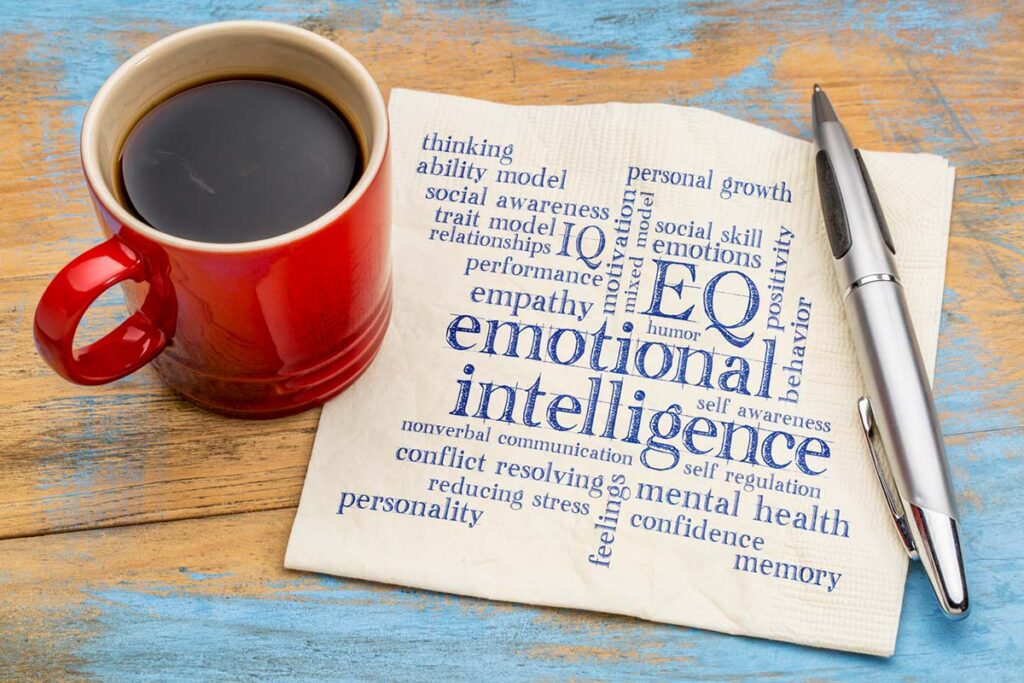If you have taken a look at our past posts on EI, you’ll know how it is defined and how important it is in the workplace. With all of this new information, it’s easy to feel overwhelmed. Perhaps you are questioning if you have what it takes to be an emotionally intelligent employee or employer. We think you do.
At WeLearn’s Learning Development blog, we believe that if you have the desire to learn, nothing can stop you. This post will provide you with concrete ways to enhance your EI, introduce it in the workplace, and actively incorporate it into your hiring process to ensure that your business is operating on the highest level possible.
Stay Constantly Connected With Yourself
Become more self-aware: Begin with what’s happening inside before you start trying to change what’s happening on the outside. We suggest paying attention to how you are feeling throughout your workday, and actively assessing what is contributing to your emotions.
Perhaps you notice that Wednesdays are especially hard because you are saddled with more projects. Maybe Fridays cause stress because you need to express your ideas to others at a weekly meeting. Take note of how your emotions contribute to your decisions and actions instead of trying to suppress them.
It’s important to identify and understand not only your emotional weaknesses but your strengths as well. If you become easily overwhelmed in large groups and thrive in small-team environments, communicate that to your employer. If you get sad working inside all day, find a way to work in the sunshine or take lunch breaks outdoors.
Keep a journal:The best way to monitor and reflect upon your emotions and reactions is to write about them. Keep a journal in your desk drawer, jot down your thoughts in your free time, and at the end of the week, take a look back at how and why your emotions changed.
Employee Engagement and Personal Engagement
Practice self-regulation: While identifying emotions is important, it’s also important to handle them professionally. Snapping at your coworker or insulting your boss will only lead to resentment in the workplace, and will negatively impact your professional development goals.
Keeping your emotions in check is not always easy, so find techniques that help you deal with your work-related stress. This could look like a new hobby, like gardening or painting.
To rid yourself of negative thoughts and boost your endorphins, consider the benefits of exercise. Studies have proven that even a little bit of exercise can help you manage difficult situations and feel more confident about yourself in every aspect of life. This doesn’t mean you need to be perfect right away.
Start small by taking the stairs instead of the elevator, or substituting your coffee break with a brisk walk. Be patient with yourself, monitor your progress, and take time to think before saying something that might hurt those around you.
Emotionally Intelligent Talent Acquisition Strategy
Interview for emotional intelligence: As an essential stakeholder, one of the best ways to improve EI in the workplace is to make sure your new workers prioritize it just as much as you do.
Oftentimes, interviews do not have a strict structure. Usually, we allow people to be vague in their responses, and avoid the questions that really grant us insight into their character. Perhaps you have asked candidates directly about their emotional intelligence or EI-related competencies. If so, be aware that employees might be painting an idealized version of themselves and not being transparent with you.
Consider asking questions such as:
- How do you de-stress after a tough day at the office?
- What’s something you’ve achieved that you’re most proud of and why?
- How do you respond when a co-worker challenges you?
- How do you recover from failure?
- What kind of behavior makes you angry/annoyed?
These questions will give you a better idea of how candidates react in real-life situations, and how they treat themselves and others.
You Can Overcome Your Workforce Development Challenges
Understanding your own emotions and working on your emotion recognition and management is tough. It requires some discipline, and the desire to improve. The good news is, if you are reading this post, you are already putting in the work to be a better employee or employer.
What are your thoughts on emotional intelligence? Do you think it’s that important? How do you get a read on someone’s emotional intelligence without using tests? Let us know your thoughts, struggles, and hopes here at WeLearn’s learning development blog.

